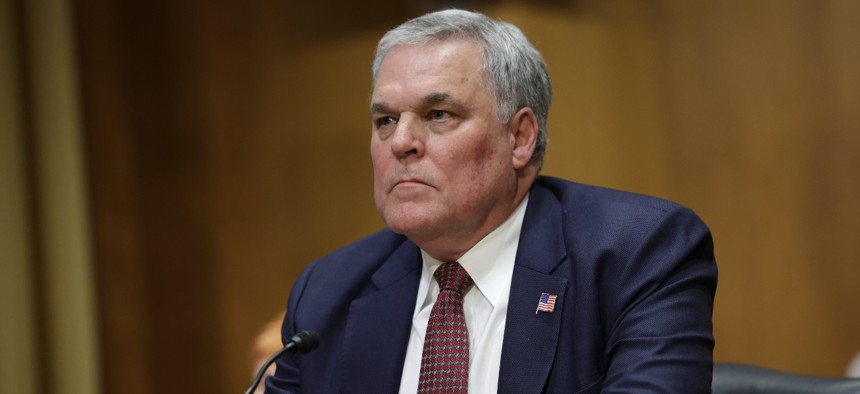Millions of Tax Returns Are Currently Delayed Due to IRS Staff Shortages
The tax agency has hired less than 10% of the processing staff it says it needs, IG finds.
The Internal Revenue Service is failing to process millions of tax refunds in a timely manner due to staffing shortages, as it continues to struggle to bring on desperately needed employees, according to the agency’s inspector general.
As of mid-March, IRS had onboarded just 9.5% of the nearly 5,500 submission processing staff it hopes to hire for the filing season, the Treasury Inspector General for Tax Administration found in a report released on a Thursday. The agency is still short about 5,000 employees in that position alone. It has found more success in hiring for accounts management—workers who handle taxpayer interactions, including by answering calls—filling 77% of its vacancies. Still, the IG said IRS is nearly 1,200 employees short of where it wants to be.
More than one-in-four taxpayer assistance centers, where individuals can schedule in-person appointments, are closed due to staffing shortages, the IG said. About half of the centers only have one or two employees and are subject to those workers’ availability.
Due to the shortfalls, “millions of tax returns are not being timely processed, refunds are not being timely issued, and taxpayers are not receiving timely assistance with their tax account issues,” the IG said.
The agency appears to have made some progress since the watchdog wrapped up its report. IRS has said in March it hopes to add 5,000 employees per year for the next two years to address its backlogs and Commissioner Charles Rettig recently told lawmakers it is already halfway to its goal for 2022. Congress “rescued” the agency from “death” when it provided direct hiring authority in March, Rettig said.
Despite that success, the IG recommended IRS develop a new approach to address its staffing issues.
“The continued and ongoing hiring shortfalls of employees needed to fill mission-critical submission processing positions warrant the ongoing development of new hiring and retention initiatives and strategies,” the watchdog said. “Approaches to date have not resolved the significant hiring and staffing shortfalls.”
IRS has taken other measures in the interim to reduce its unprecedented pending casework. It has mandated overtime for 6,000 employees and allowed for voluntary overtime for an additional 10,000 workers, deployed surge teams and brought on contractors. IRS started the filing season with 8 million backlogged returns and while it has made some progress, there are still about 6 million outstanding.
The IG is separately conducting probes in how IRS is addressing its backlogs, as well as its staffing shortages. Rettig has said IRS has found great success in recent job fairs since receiving direct hire authority. At those events, he said, the agency has hired 90% of those who show up.
Congress has provided IRS with a funding increase of $675 million as part of the fiscal 2022 omnibus spending bill, the largest bump since 2001. President Biden requested an additional 18% bump for fiscal 2023, and has sought an $80 billion surge over 10 years as part of his larger social and climate spending package. Republicans pushed back on the need for more spending at IRS, saying the agency must learn to be more efficient.
Rettig has said IRS is still facing a $100 million shortfall for operations support in the current fiscal year, warning the agency will have to make cuts elsewhere in its budget if the situation is not addressed.




